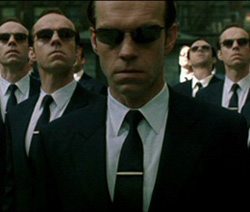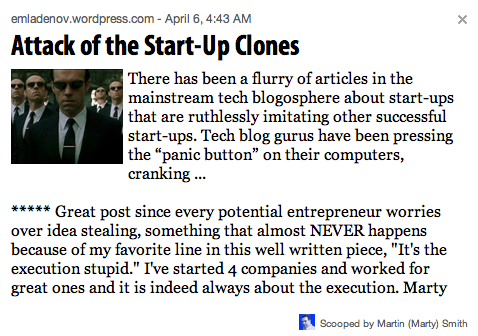 There has been a flurry of articles in the mainstream tech blogosphere about start-ups that are ruthlessly imitating other successful start-ups. Tech blog gurus have been pressing the “panic button” on their computers, cranking out posts after posts of cautionary tales of how no dear child of Silicon Valley is safe because there are always “bad guys” lurking behind the corner, ready to jump on his/her idea and steal it. I started reading some of those articles for pure amusement but soon became convinced that the “start-up cloning” topic is getting out of proportion. So I decided to write my opinion, hoping to put things in perspective (which I dare say has been lacking from most posts on the topic that I’ve read so far).
There has been a flurry of articles in the mainstream tech blogosphere about start-ups that are ruthlessly imitating other successful start-ups. Tech blog gurus have been pressing the “panic button” on their computers, cranking out posts after posts of cautionary tales of how no dear child of Silicon Valley is safe because there are always “bad guys” lurking behind the corner, ready to jump on his/her idea and steal it. I started reading some of those articles for pure amusement but soon became convinced that the “start-up cloning” topic is getting out of proportion. So I decided to write my opinion, hoping to put things in perspective (which I dare say has been lacking from most posts on the topic that I’ve read so far).
Quick History on the Topic
Back in September 2011, BetaBeat published a detailed account of the many knockoffs that were mushrooming in the wake of overhyped start-up launches, such as Turntable.fm or Groupon. As the article itself suggested, the phenomena of “fast follower startups” was not new at all. The author traced it back to the early dot-com era in the 1990s.
Although articles such as the BetaBeat post were interesting, they were not truly captivating. The real panic hype began when the tech bloggers found a culprit worthy of being a media sensation. Thus, the Samwer brothers had slowly but steadily stepped into the spotlight. Mac, Oliver and Alexander Samwer are three German brothers who had started a business model incubator, called Rocket Internet. The incubator was quickly dubbed the “German clone factory” by the tech bloggers. The story became pure gold for the likes of GigaOm and TechCrunch. After all – what better nemesis for the Silicon Valley wonder boys than a trio of charismatic but “evil” brothers who are slyly mobilizing “ze German” manufacturing machine to spin off countless knockoffs!
If you don’t believe me – just look at GigaOm’s posts in the past one month:
- March 2, 2012:The Samwer Brothers Suddenly Lose Their Shyness
- March 7, 2012:Exclusive: Wrapp CEO Goes Toe to Toe with Samwer Bros.
- April 4, 2012:Now Samwer Brothers Look Set to Clone Square
And, of course, let’s not forget about some of the colorful (to say the least) epithets used to describe these three entrepreneurs:
- GigaOm calls them “Europe’s most successful — and notorious — internet entrepreneurs.”
- Hackful.com calls them “notorious for cloning American startups.”
The Problem with all This Sensation-Laden Jabber
Despite its undoubtedly entertaining value, the story of Samwer Brothers’ clone wars is overrated. What is happening in reality is that many successful start-ups become cozy with the hype generated in the media in their local markets. Since many of them come from the Silicon Valley, which is in the heart of a thriving market, full of early adopters, these start-ups become quickly content with limiting their definition of the world as only the West Coast or — at best — the North American (read U.S. and Canada) market. They enjoy healthy top-line growth in this limited but lucrative world of theirs. They don’t really feel a strong urge to get out in the vast but “challenging” world that exists in Europe or Asia. They keep talking about international expansion (because this is what the journalists and investors want to hear) but rarely think seriously about following through on their promises. Thus, it may take years before some of the major European markets (i.e., UK, Germany, France) see local efforts by the Silicon Valley heroes of the day. Smaller markets (take for example, Bulgaria) may never even see localized versions of those services.
The natural law of business dictates that entrepreneurs in those markets would quickly realize the void and fill it with their own interpretation of the same idea. Due to their proximity to the local markets and expertise dealing with the local regulatory environment, they have a natural advantage over their Silicon Valley counterparts. As a result, the original start-ups, which may have been the innovators on their native West Coast, often and quickly become relegated to the laggards in other countries.
It’s the Execution, Stupid!
While many tech bloggers succumb to their partial emotions and label this phenomenon as ruthless cloning, I consider it essential to everyday business. The moment you come up with an idea, the clock starts ticking very fast. Chances are someone else has come up with your idea, as well. Even greater chances are someone will see your idea, understand its potential, and come up with a better way to execute on it. You either move in fast to fill the void in as many markets as you can, or you concede that you’ll lose market share to followers. Such is the law of survival in the free-market world.
Steve Jobs, himself, liked to quote Pablo Picasso, saying that “good artists copy, great artists steal.” The concept for the Mac’s graphical user interface (GUI), including the mouse as the key input device, emerged after Jobs and his team visited Xerox PARC and saw that company’s prototypes. Xerox had invented the GUI and mouse, but had failed to capitalize on those inventions in a meaningful and — most importantly — consumer-friendly way. Steve Jobs saw that, figured out what was missing from Xerox’s implementation, and came up with a much better execution.
To rephrase the famous Clinton-era adage, “it’s the execution, stupid — not the idea!”
Potential Benefits from the So-Called “Clone Wars”
Instead of panicking, I actually feel encouraged when I hear stories, such as the ones about the Samwer brothers. As in many other areas, competition brings around higher quality, faster implementations, greater innovation. Therefore, if Square knows that the Samwer brothers are after the smartphone micro-payments business in Western Europe, then the Silicon Valley darling will start thinking about innovating its ubiquitous white credit card readers to allow accepting pin-and-chip cards.
Perhaps, the “rise of the fast follower start-ups” will first bridge the two coasts in the U.S. in terms of product innovation and adoption, and then quickly span across the Atlantic to connect to many ripe markets in Europe, Africa, Middle East, and the Asia-Pacific. Hopefully, this will bring faster many of the goodies that our friends in San Francisco and Palo Alto have — for years — been enjoying in (almost permanent) beta testing to the rest of us who do not reside in the Bay Area.
Maybe one day the Samwer brothers will be the protagonists in business school cases and management consulting books, illustrating how acting fast and acting right on an idea may trump coming up with the idea itself.
Who knows?! Only time will tell whether any of these predictions will turn out right or wrong.
Update: April 9, 2012 — Feedback from the Field
I can’t help highlighting an awesome comment that Martin (Marty) Smith made regarding my post, while scooping it in the Startup Heroes section on Scoop.it. It’s always great to hear words of approval and confirmation from someone who has 4 start-ups under his belt. Here is the screenshot with the comment.
Thanks Marty!
Update 2: April 11, 2012 — The Hype about the Samwer Brothers Rages On!
GigaOm published another post about the Samwer brothers today (April 11, 2012). This time, the tech blog gurus were getting excited about the geographic footprint of the Samwer brothers’ empire. According to their investigation, Rocket Internet has 38 companies across 58 countries (and counting)! Here is a map of Rocket Internet’s span:

The Samwer Brothers' Global Empire
I think this is worth mentioning here for two reasons:
- The new post marks an interesting and noticeable change in the tone used to describe the Samwer brothers. Whereas until recently most articles were hardly even trying to conceal their ridicule as they described the “German clone factory,” freshly minted posts are starting to show a bit of respect and awe. And awe they should reveal! How many young brothers have together managed to launch 30+ operations across the entire world in less than a decade?
- The map featured in the article emphasizes one of my main arguments. If someone can take a business model and adapt it to fit into multiple countries across all major regions of the world, they should never be labeled “copycats” or “knockoffs.” Someone with that level of international business expertise deserves their own place in the Present-Day Hall of Entrepreneurship Fame. Anyone who dismisses Rocket Internet as a “clone incubator” does so at their own risk (and for the sake of their own business ignorance).
What are your thoughts on this issue? Do you think Samwer brothers’ business model is deplorable? Or would you rather categorize it as the natural law of evolution in business? Let me know of your opinions in the Comments section.




Awesome post. The idea alone is never enough….all about execution
Thanks for your feedback, Allyn! Hope all is going well!
Emil
Pingback: Attack of the Start-Up Clones | Startup Heroes | Scoop.it
Pingback: Attack of the Start-Up Clones | Curation Revolution | Scoop.it